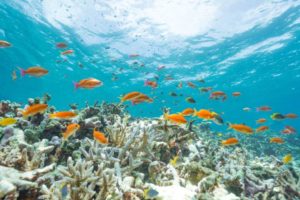by J. Marohasy’sBlog, Feb 20, 2022
The concept of ocean acidification, and human-caused global warming more generally, could be described as containing a grain of truth embedded in a mountain of nonsense. Indeed, the projected large increase in atmospheric CO2 will at most cause a small reduction in pH – it will not turn the ocean acidic. Yet this is what is implied by the term ocean acidification. True acidification would require average pH to be reduced below 7.0, at which point seashells would indeed begin to dissolve. This is an impossible scenario, however, because of the ocean’s effectively limitless buffering capacity.
There is a newly published study by Jeff Clements and team that concludes many of the published studies on ocean acidification, especially those studies published in high impact journals and accompanied by sensational media reporting, have turned-out to be wrong, or at least exaggerated.
My colleague Peter Ridd describes the situation:
This problem with exaggeration of threats applies to many areas of science and has a name: The Decline Effect.
The Decline Effect goes like this: an early report, usually attracting huge media interest, predicts some sort of catastrophe. But when follow up work is done, usually with far better experimental procedure and far greater numbers of samples, the original report turns out to be wrong.
Jeff Clements’ team included Timothy Clark, Josefin Sundin and Frederik Jutfelt who were involved in a study last year proving that numerous reports by James Cook University’s coral reef centres on reef fish was totally wrong.
I co-authored a book chapter with John Abbot some years ago that explained:
…

